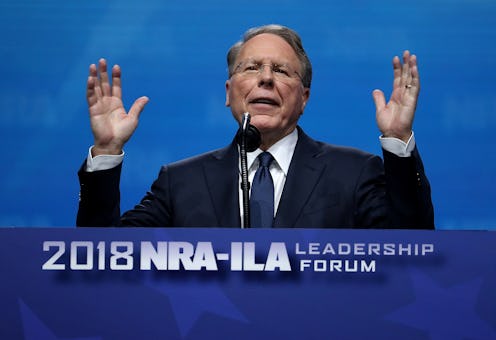News
The NRA Says It May "Be Unable To Exist" — Here's What To Know About Its Situation

The National Rifle Association (NRA) in 2016 was a behemoth financially, donating $54 million in presidential and congressional races. Now, less than two years later, it's arguing economic hardship and even that it may soon "be unable to exist" in a recent court filing. But running out of money is not the reason why the NRA could shut down. That has more to do with a newfound difficulty around obtaining insurance.
Both of the concerns stem from actions that New York state took earlier in 2018, the NRA argues in its court filing. New York Law Journal first reported the suit, which was originally filed in June and argues that New York officials violated the group's constitutional rights with targeted efforts to keep banks and insurers from working with it. The dire language about ceasing to exist came in an amendment to that complaint that was filed in late July, explaining the effect officials' actions allegedly had on the organization.
The NRA says that because of money lost due to New York officials' actions, it may have to cease providing all sorts of benefits to its members including NRATV, print publications, meetings, and educational programs. Even its ability to "hold rallies, conventions and assemblies" is in question, per the filing.
But it's not about the money, even though the NRA argues it has lost some revenue as a result of New York state's actions. What's really of concern is insurance.
"Insurance coverage is necessary for the NRA to continue its existence," the filing argued. The NRA has been unable to find corporate insurance coverage, media liability coverage, or banking services.
The group's attorney, William Brewer III, said in a statement that both banking services and insurance difficulties are "a result of a political and discriminatory campaign meant to coerce financial institutions to refrain from doing business with the NRA."
"The actions of defendants are a blatant attack on the First Amendment rights of our organization," Brewer continued.
Gov. Andrew Cuomo is undeterred. "New York will not be intimidated by the NRA’s frivolous lawsuit to advance its dangerous gun-peddling agenda," he said in a statement. This year, while running for reelection, Cuomo has pushed the state to target the NRA's ties to financial institutions and insurers.
In April, the governor told the state's Department of Financial Service (DFS) to tell banks based in the state and insurers regulated by the agency to refrain from doing business with the NRA.
DFS Superintendent Maria Vullo did just that and warned New York-chartered and -licensed financial institutions in a letter "to continue evaluating and managing their risks, including reputational risks, that may arise from their dealings with the NRA or similar gun promotion organizations."
Then in May, DFS fined Lockton Cos LLC $7 million for its role administering and underwriting the NRA's Carry Guard insurance, arguing that it was against New York law. DFS said in a statement that Carry Guard "unlawfully provided liability insurance to gun owners for certain acts of intentional wrongdoing, and improperly provided insurance coverage for criminal defense."
Vullo called it an "egregious violation of public policy designed to protect all citizens." The NRA had marketed the product online, via email, and through direct mail — all without a New York insurance license, DFS's investigation found.
Whether these actions unfairly single out the NRA will be decided in court, but the move by financial institutions to distance themselves from the group began before DFS took such actions. Groups like MetLife cut ties to the group as early as February in response to the Parkland, Florida, high school shooting.
Although the NRA claimed in its filing that they were losing money because of New York, they did not say how much money they had left or give a timeline on how long they could continue to function with what they have left. With that, it's up in the air if the organization will actually be forced to stop operating or limit its services — and when that would happen.